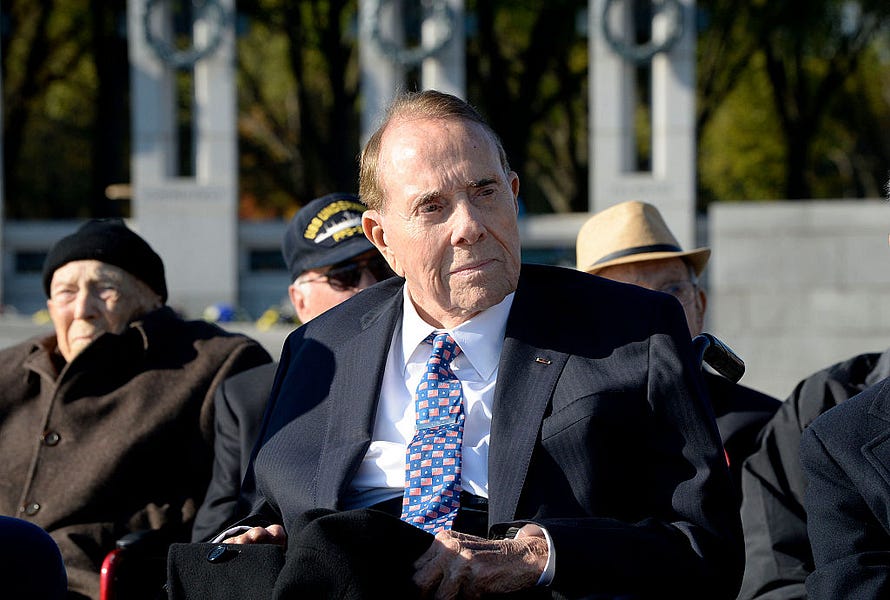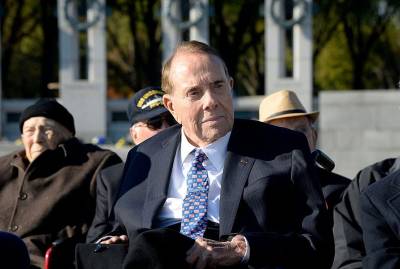It was a warm June morning in 2002, and Bob Dole was feeling confident about where the campaign for the national World War II Memorial was going.
“I don’t know how many times I was told ‘giving money for the memorial wasn’t in our company’s plans,’” Dole said as we sat in his Washington law office and talked. “I always made the same answer when I heard that excuse. ‘World War II wasn’t in my plans,’ I replied."
Dole knew he was a tough man to refuse when it came to the World War II Memorial. In 1997 he had agreed to become chairman of the memorial campaign, and he wasn’t about to make things easy for the business leaders and corporations he thought should be helping to fund the memorial.
I was interviewing Dole for a book I was writing about the World War II Memorial, and I had expected our conversation would focus on the details of financing it, but for Dole talking about the memorial was, I realized, a way of talking about what you owed the country and what the country owed you.
Dole had paid his dues to the country in 1945, when, as a member of the 10th Mountain Division, he was severely wounded in Italy and permanently lost the use of his right arm. The Dole who was pressuring business leaders and companies to help fund the World War II Memorial was a complicated man who was doing his best to make sure others paid their dues to the country—at least minimally.
He was also the poor boy from Kansas who had seen his parents struggle in the Great Depression and who had to worry about money to pay for college and recover from his war injuries. He would, he realized, never have gotten the political power he acquired without help. Like many veterans, he returned to college on the GI Bill.
For Dole, no possession in his life had more symbolic importance than the cigar box in which neighbors in his hometown of Russell, Kansas, collected the coins and dollar bills that enabled him to pay for his medical bills. And no person beyond his family had more impact on him than Hampar Kelikian, the Armenian-born surgeon who operated on Dole multiple times and refused to charge him. Kelikian, who welcomed Dole into his home, was a “second father to me,” Dole would later say. Paying back Kelikian, who taught him story of the Armenian genocide, took the form of calling for American acknowledgement of the genocide, which became a reality in 2021 when President Biden officially recognized it.
When Dole talked about his recovery from his war wounds, he talked about the two future senators and World War II vets—Philip Hart of Michigan and Daniel Inouye of Hawaii, he met in the military rehab center in Battle Creek, Michigan, where he learned to compensate for the movement he would never get back in his right arm. Hart and Inouye were part of his “band of brothers.” And they would always be so, no matter how they voted in the Senate.
After eight years in the House of Representatives and 23 in the Senate, Dole was a national Republican fixture for more than three decades, but in a way that would be anathema to today’s Republican Party: Dole knew how to reach across the aisle to pass important legislation. He worked with George McGovern and Hubert Humphrey in 1977 to make food stamps more accessible to the poor. He worked with Daniel Patrick Moynihan in 1983 to extend the solvency of Social Security. He worked with Ted Kennedy in 1990 to pass the Americans with Disabilities Act. He also voted for the Civil Rights Act of 1964 and the Voting Rights Act of 1965.
Dole didn’t want pats on the back for doing what seemed right, and his office reception room reflected that determination. There were very few signs in it of Dole’s many honors. On display was one of the Purple Hearts that he earned and a framed citation of the Presidential Medal of Freedom that President Clinton had awarded him. But what caught my eye were the paintings hung around the room of the prairies Dole would have known growing up in Kansas.
Dole had not gained political success by being shy. But tooting his own horn was not something he enjoyed. He was like the vets who would come by the World War II Memorial construction site with their dog tags and ask the workers to bury the tags in the foundation. In the future, nobody other than the vets and their families would know what had happened to the dog tags, but that was fine. Sharing in a larger undertaking and avoiding personal display was what mattered most.
Nicolaus Mills is professor of literature at Sarah Lawrence College and author of Their Last Battle: The Fight for the National World War II Memorial.






Please note that we at The Dispatch hold ourselves, our work, and our commenters to a higher standard than other places on the internet. We welcome comments that foster genuine debate or discussion—including comments critical of us or our work—but responses that include ad hominem attacks on fellow Dispatch members or are intended to stoke fear and anger may be moderated.
With your membership, you only have the ability to comment on The Morning Dispatch articles. Consider upgrading to join the conversation everywhere.